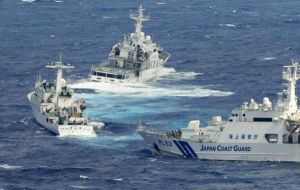MercoPress. South Atlantic News Agency
Senkaku/Diaoyu Islands: Another Falklands?
 Chinese patrol vessels challenging the Japanese
Chinese patrol vessels challenging the Japanese By Gwynne Dyer - Chinese survey vessels go into the waters around the disputed islands and Japanese patrol ships tail them much too closely. Twice last month Chinese maritime surveillance aircraft flew into the airspace around the Japanese-controlled islands and Tokyo scrambled F-15 fighters to meet them. On the second occasion, China then sent fighters too. Can these people be serious?
The rocky, uninhabited group of islets in the East China Sea, called the Senkaku Islands by Japan and the Diaoyu Islands by China, are worthless in themselves, and even the ocean and seabed resources around them could not justify a war. Yet both sides sound quite serious, and the media rhetoric about it in China has got downright bellicose.
Historical analogies are never exact, but they can sometimes be quite useful. What would be a good analogy for the Senkaku/Diaoyu dispute?
The dispute between the United Kingdom and Argentina over the islands that the British call the Falklands and the Argentines call las Malvinas fits the case pretty well.
Worthless islands? Check, unless you think land for grazing sheep is worth a war. Rich fishing grounds? Check. Potential oil and gas resources under the seabed? Tick. Rival historical claims going back to the 19th century or “ancient times”? Check. A truly foolish war that killed lots of people? Yes, in the case of the Falklands/Malvinas, but not in the Senkaku/Diaoyu Islands. Not yet.
One other difference: the Falkland Islands have been inhabited by some thousands of English-speaking people of British descent for almost two centuries. Argentina’s claim relates to a short-lived colony in 1830-33 (which was preceded by somewhat longer-lived French and British colonies in the 1700s). Whereas nobody has ever lived on the Senkakus/Diaoyus.
Curiously, this does not simplify the quarrel. Neither China nor Japan has a particularly persuasive historical claim to the islands, and with no resident population they are wide open to a sudden, non-violent occupation by either country. That could trigger a real military confrontation between China and Japan, and drag in Japan’s ally, the United States.
It was to avert exactly that sort of stunt that the Japanese government bought three of the islands last September. The ultra-nationalist governor of Tokyo, Shintaro Ishihara, announced that he would use public money to buy the islands from their private Japanese owner, and the Foreign Ministry suspected that he would then land people there to assert Japanese sovereignty more vigorously.
The Chinese would probably respond in kind, and then the fat would be in the fire. But the Japanese government’s thwarting of Ishihara’s plans did not mollify the Chinese. The commercial change of ownership did not strengthen or weaken either country’s claim of sovereignty, but Beijing saw it as a nefarious Japanese plot, and so the confrontation began to grow.
It has got to the point where Japanese business interests in China have been seriously damaged by boycotts and violent protests, and Japan’s defence budget, after ten years of decline, is to go up a bit this year. (China’s defence budget rises every year.) It’s foolish, but it’s getting beyond a joke.
Meanwhile, down in the South China Sea, a very similar confrontation has been simmering for years between China, which claims almost the entire sea for itself, and the five other countries (Vietnam, Malaysia, Brunei, the Philippines and Taiwan) that maintain overlapping claims over various parts of the sea.
Military manoeuvres are taking place, non-negotiable declarations of sovereignty are being made, and navies are being beefed up. Once again there are fishing rights at stake in the waters under dispute, and oil and gas reserves are believed to exist underneath them. The United States, because of its military alliance with the Philippines, is also potentially involved in any conflict in this region.
All this nonsense over fish and petrochemical resources that would probably not yield one-tenth of the wealth that would be expended in even a small local war. Moreover, the oil and gas resources, however big they may be, will remain unexploited so long as the seabed boundaries are in doubt. So the obvious thing to do is to divide the disputed territory evenly between the interested parties, and exploit the resources jointly.
This is what the Russians and the Norwegians did three years ago, after a decades-long dispute over the seabed between them in the Barents Sea that led to speculations about a war in the Arctic.
The Japanese and the Chinese could obviously do the same thing: no face lost, and everybody makes a profit. A similar deal between the countries around the South China Sea would be more complicated to negotiate, but would yield even bigger returns. So why don’t they just do it?
Maybe because there are islands involved. Nobody has ever gone to war over a slice of seabed, but actual islands, sticking up out of the water, fall into the category of “sacred national territory, handed down from our forefathers,” over which large quantities of blood can and must be shed.
China will not just invade the Senkaku/Diaoyu Islands, because it is not run by a drunken and murderous military dictator (as Argentina was when it invaded the Falklands in 1982). But could everybody stumble into a war over this stupid confrontation? Yes, they could.





Top Comments
Disclaimer & comment rules-

-

-

Read all commentsOnce again, I do not see a connection?
Mar 04th, 2013 - 06:36 am 0' hey dis rice tastes rubbery'
Mar 04th, 2013 - 07:15 am 0'faank yoah, I make it myself'
”because it is not run by a drunken and murderous military dictator (as Argentina was when it invaded the Falklands in 1982).”
Mar 04th, 2013 - 10:12 am 0Doesn't sound TOO dissimilar from Argentina's current dictator.
Commenting for this story is now closed.
If you have a Facebook account, become a fan and comment on our Facebook Page!